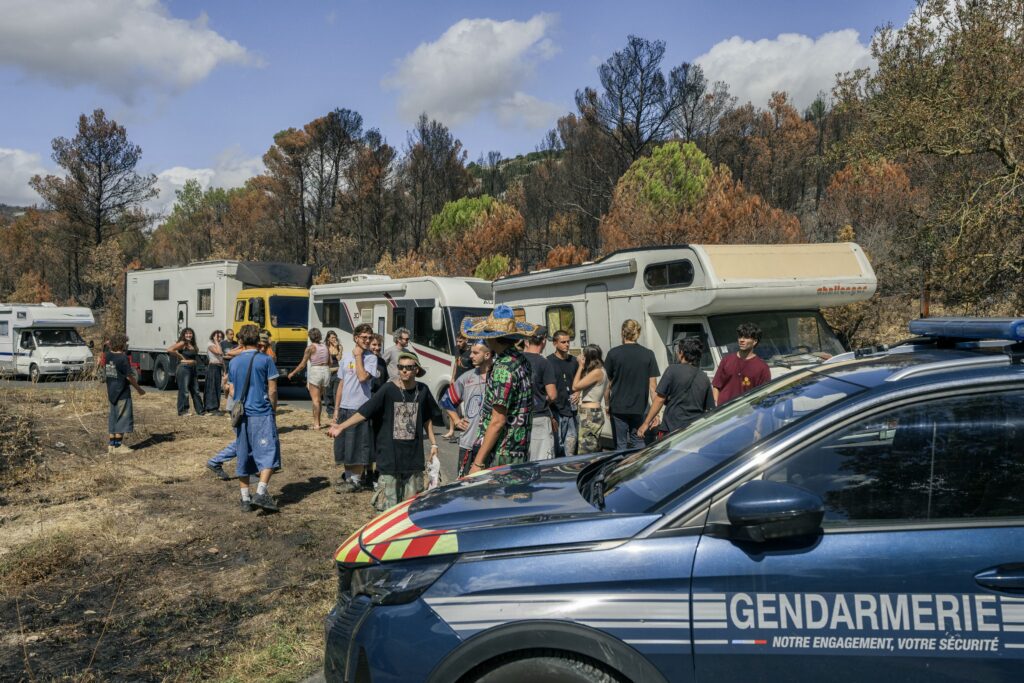Aude: rave party au milieu des cendres de l’incendie, des habitants exaspérés
Les nerfs sont à vif parmi les habitants des Corbières touchés par le grand incendie d’août dans l’Aude, excédés par la rave party entamée il y a trois jours au milieu des terres calcinées.”La rave continue. La tension est en train de monter. Après les incendies qu’on a connus, les habitants sont à bout de nerfs, on a des gens qui ont tout perdu, et ceux-là qui font la fête au milieu, ça va mal finir”, déplore Christophe Tena, le maire de Fontjoncouse, village viticole de 140 habitants.Après avoir atteint un pic de 2.500 participants, selon la préfecture de l’Aude, 1.500 fêtards restaient présents lundi sur le campement improvisé, formé par des dizaines de camions immatriculés en France, en Espagne, en Italie.La rave party se déroule depuis vendredi soir dans une plaine agricole située entre Fontjoncouse et Coustouge, des villages au coeur d’une zone sinistrée par le gigantesque incendie qui a parcouru 16.000 hectares dans l’Aude du 5 au 10 août, et a notamment détruit 36 habitations et tué une personne.- “Désespoir” -“C’est déplacé. On est dans le désespoir complet. C’est lamentable”, déclare à l’AFP Fabien Vergnes, viticulteur à Tournissan, un autre village affecté par l’incendie géant.Le chef 3 étoiles Gilles Goujon, dont le restaurant est à Fontjoncouse, a également fait part de son exaspération: “C’est inqualifiable. Il y a des mecs qui ont tout perdu ici. Et eux viennent danser sur les cendres de ces gens-là”, a-t-il affirmé sur France Info.”Ils sont sur des propriétés privées, sans autorisation, ils détruisent tout et la préfecture me dit qu’on ne peut rien faire pour les faire partir. On marche sur la tête. Les gens sont en colère, ça risque de dégénérer”, souligne de son côté M. Tena.Des voitures de fêtards, garées le long des routes, ont été endommagées et des altercations ont opposé des jeunes venus de toute la France à des paysans ou villageois excédés.Dans ce contexte, le ministre de l’Intérieur Bruno Retailleau a estimé lundi soir sur TF1 que l’organisation de rave parties doit devenir “un délit et non pas seulement une contravention”, précisant vouloir s’inspirer de la “législation très dure” adoptée il y a trois ans par l’Italie.Dans un paysage dévasté par l’incendie, des jeunes gens équipés de sacs à dos et sacs de couchage cherchant encore à se rendre à la rave party en croisent d’autres, qui marchent des kilomètres puis font du stop afin de quitter la zone vallonnée où domine le roux et le noir. L’incendie a tout ravagé à plusieurs kilomètres à la ronde.- “Zombieland” -Faute de pouvoir les déloger, les forces de l’ordre tentent d’empêcher l’accès au site.Les amendes à 135 euros pleuvent sur ceux qui ont participé à la fête illégale.Dans un communiqué diffusé lundi à la mi-journée, la préfecture de l’Aude a appelé les fêtards à quitter les lieux et averti que “l’ensemble des personnes contrôlées seront verbalisées pour le non-respect de l’arrêté préfectoral interdisant l’accès à zone de feu”.Sur le chemin du retour, Célia, débardeur noir et piercing au nez, assure que les organisateurs ont baissé le volume du sound system. “Quand on est arrivé, c’était un peu Zombieland”, dit-elle. Pourquoi un tel rassemblement à cet endroit? “Je ne sais pas, répond-elle, peut-être que l’organisation s’est dit que comme c’était brûlé on n’allait pas gêner”.Des gendarmes mobiles et des CRS ont été dépêchés sur les lieux. Un hélicoptère survole le rassemblement. Une équipe de la protection civile est également présente.”Et ça pourrait durer jusqu’à mardi. Tant qu’ils ont à boire, à manger, à fumer, ils ne s’en vont pas. Je ne sais plus quoi faire”, confie, dépité, le maire et viticulteur de Fontjoncouse, actuellement occupé par les vendanges.Trois participants à la rave party ont été placés en garde à vue pour des délits routiers et des infractions à la législation sur les stupéfiants, selon la gendarmerie.






